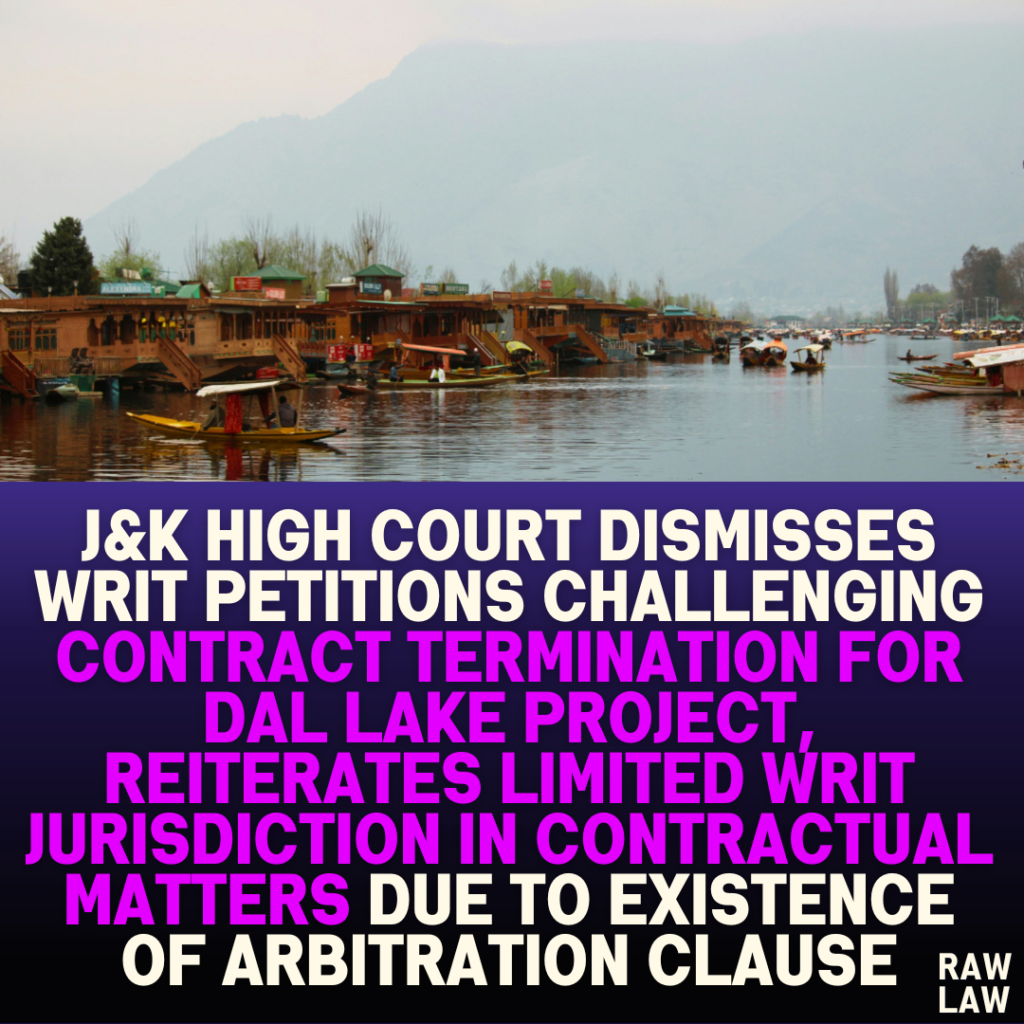Court’s Decision:
The High Court of Jammu & Kashmir and Ladakh dismissed the writ petitions challenging the termination of a contract for the supply of Weed Harvesters-cum-Skimmers. The Court held that the matter involved disputed questions of fact, which cannot be adjudicated under its writ jurisdiction, and directed the petitioner to pursue arbitration or other remedies. The Court emphasized that the project’s importance as an infrastructure development, specifically the cleansing of Dal Lake, further precluded granting an injunction under Section 41(ha) of the Specific Relief Act.
Facts:
The petitioner was awarded a contract through a letter of intent dated June 15, 2024, for the supply of eight Weed Harvesters-cum-Skimmers for Dal Nigeen Lake. However, the petitioner failed to mobilize all eight machines within the stipulated period of 15 days from the issuance of the letter of intent, despite receiving notices from the official respondents. By July 29, 2024, the petitioner had only deployed five machines. As a result, the contract was partially terminated to the extent of three machines, and the remaining machines were hired from another contractor.
Issues:
The primary issue was whether the writ petition was maintainable despite the existence of an arbitration clause in the contract and whether the termination of the contract for non-supply of machines was arbitrary.
Petitioner’s Arguments:
The petitioner contended that the reduction in the mobilization period from 25 to 15 days was unfair and that delays in transportation were beyond their control due to restrictions during the Amarnath Yatra. The petitioner further argued that the respondents’ actions were arbitrary, as they terminated part of the contract without properly considering the external factors affecting the supply of machines.
Respondent’s Arguments:
The official respondents argued that the petitioner had violated the terms of the contract by failing to mobilize all eight machines within the agreed period. They pointed out that the petitioner had prior knowledge of the reduced mobilization period through a corrigendum issued before the final date of bidding. The respondents also highlighted that an arbitration clause existed in the contract, making the writ petition non-maintainable.
Analysis of the Law:
The Court relied on established legal principles, notably from the Supreme Court’s decisions in ABL International Ltd. v. Export Credit Guarantee Corporation of India and Union of India v. Tantia Construction Pvt. Ltd., affirming that writ jurisdiction can be invoked in contractual matters if the State’s action is arbitrary or violates Article 14 of the Constitution. However, in cases involving disputed facts or contractual breaches, arbitration or civil suits remain the proper forums for resolution.
Precedent Analysis:
The Court referred to the Supreme Court’s ruling in N.G. Projects Limited v. Vinod Kumar Jain, emphasizing that writ courts should be cautious in interfering with contracts related to infrastructure projects, particularly when an alternative remedy, like arbitration, is available.
Court’s Reasoning:
The Court held that the petitioner had failed to establish arbitrariness in the respondents’ actions, as the petitioner was unable to meet the contractual deadlines. Given that the contract was determinable and an arbitration clause existed, the Court declined to exercise its writ jurisdiction. Additionally, the infrastructure nature of the project further disallowed the granting of an injunction, as per Section 41(ha) of the Specific Relief Act.
Conclusion:
The Court dismissed the writ petitions, allowing the petitioner to pursue arbitration or other remedies. It found no reason to interfere with the respondents’ actions in terminating part of the contract, particularly when the supply of machines was crucial for the infrastructure project concerning Dal Lake.
Implications:
This decision underscores the limited scope of writ jurisdiction in contractual disputes, especially when alternative remedies like arbitration are available. It also highlights the Court’s reluctance to interfere in infrastructure projects, ensuring that such projects are not delayed due to legal disputes over contracts.



